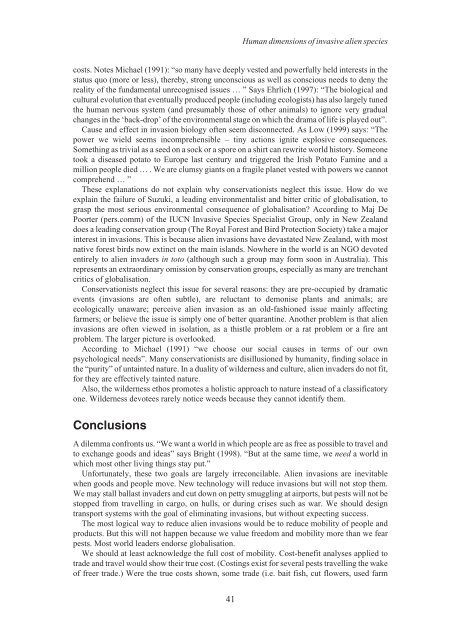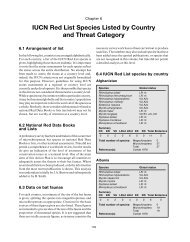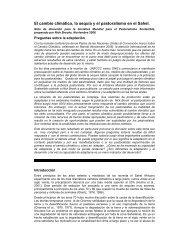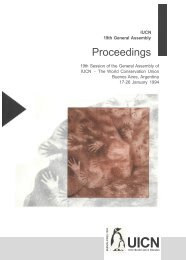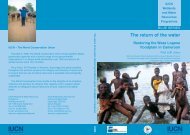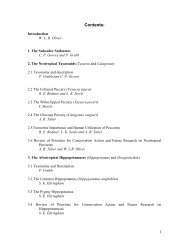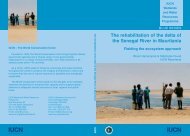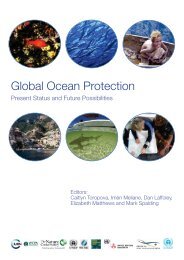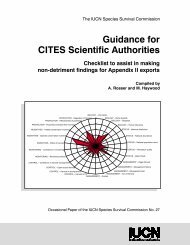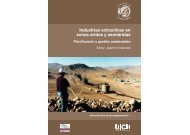Alien Species.vp - IUCN
Alien Species.vp - IUCN
Alien Species.vp - IUCN
Create successful ePaper yourself
Turn your PDF publications into a flip-book with our unique Google optimized e-Paper software.
costs. Notes Michael (1991): “so many have deeply vested and powerfully held interests in the<br />
status quo (more or less), thereby, strong unconscious as well as conscious needs to deny the<br />
reality of the fundamental unrecognised issues … ” Says Ehrlich (1997): “The biological and<br />
cultural evolution that eventually produced people (including ecologists) has also largely tuned<br />
the human nervous system (and presumably those of other animals) to ignore very gradual<br />
changes in the ‘back-drop’ of the environmental stage on which the drama of life is played out”.<br />
Cause and effect in invasion biology often seem disconnected. As Low (1999) says: “The<br />
power we wield seems incomprehensible – tiny actions ignite explosive consequences.<br />
Something as trivial as a seed on a sock or a spore on a shirt can rewrite world history. Someone<br />
took a diseased potato to Europe last century and triggered the Irish Potato Famine and a<br />
million people died … . We are clumsy giants on a fragile planet vested with powers we cannot<br />
comprehend … ”<br />
These explanations do not explain why conservationists neglect this issue. How do we<br />
explain the failure of Suzuki, a leading environmentalist and bitter critic of globalisation, to<br />
grasp the most serious environmental consequence of globalisation? According to Maj De<br />
Poorter (pers.comm) of the <strong>IUCN</strong> Invasive <strong>Species</strong> Specialist Group, only in New Zealand<br />
does a leading conservation group (The Royal Forest and Bird Protection Society) take a major<br />
interest in invasions. This is because alien invasions have devastated New Zealand, with most<br />
native forest birds now extinct on the main islands. Nowhere in the world is an NGO devoted<br />
entirely to alien invaders in toto (although such a group may form soon in Australia). This<br />
represents an extraordinary omission by conservation groups, especially as many are trenchant<br />
critics of globalisation.<br />
Conservationists neglect this issue for several reasons: they are pre-occupied by dramatic<br />
events (invasions are often subtle), are reluctant to demonise plants and animals; are<br />
ecologically unaware; perceive alien invasion as an old-fashioned issue mainly affecting<br />
farmers; or believe the issue is simply one of better quarantine. Another problem is that alien<br />
invasions are often viewed in isolation, as a thistle problem or a rat problem or a fire ant<br />
problem. The larger picture is overlooked.<br />
According to Michael (1991) “we choose our social causes in terms of our own<br />
psychological needs”. Many conservationists are disillusioned by humanity, finding solace in<br />
the “purity” of untainted nature. In a duality of wilderness and culture, alien invaders do not fit,<br />
for they are effectively tainted nature.<br />
Also, the wilderness ethos promotes a holistic approach to nature instead of a classificatory<br />
one. Wilderness devotees rarely notice weeds because they cannot identify them.<br />
Conclusions<br />
A dilemma confronts us. “We want a world in which people are as free as possible to travel and<br />
to exchange goods and ideas” says Bright (1998). “But at the same time, we need a world in<br />
which most other living things stay put.”<br />
Unfortunately, these two goals are largely irreconcilable. <strong>Alien</strong> invasions are inevitable<br />
when goods and people move. New technology will reduce invasions but will not stop them.<br />
We may stall ballast invaders and cut down on petty smuggling at airports, but pests will not be<br />
stopped from travelling in cargo, on hulls, or during crises such as war. We should design<br />
transport systems with the goal of eliminating invasions, but without expecting success.<br />
The most logical way to reduce alien invasions would be to reduce mobility of people and<br />
products. But this will not happen because we value freedom and mobility more than we fear<br />
pests. Most world leaders endorse globalisation.<br />
We should at least acknowledge the full cost of mobility. Cost-benefit analyses applied to<br />
trade and travel would show their true cost. (Costings exist for several pests travelling the wake<br />
of freer trade.) Were the true costs shown, some trade (i.e. bait fish, cut flowers, used farm<br />
41<br />
Human dimensions of invasive alien species


